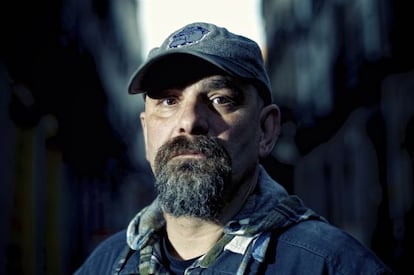'Hippy cop' who took part in 15-M assembly sees sanction overturned by judge
Roca Sierra encourages other policemen to take a moment to be citizens first


"I have never felt that I was guilty of anything, and I hope the ruling will help to prevent further attacks on freedom of expression." This was the forthright statement made to EL PAÍS by the municipal policeman Javier Roca Sierra, after the judge from Madrid's Contentious-Administrative Court no. 20, Francisco Javier Sancho Cuesta, revoked the sanction for a "serious breach of discipline" that was imposed on him by the City Council of Madrid after his participation in an assembly organized by the 15-M protest movement.
His presence at the meeting cost him five days' pay and suspension from duty, amounting to a loss of some 500 euros.
"I hope that my case means that no one's right to free expression is curtailed," he told this newspaper.
A policeman is entitled to hold an opinion on issues of public interest"
The judge ruled that the municipal policeman - who himself has no objection to being labeled with the term " poliflauta " (hippy cop) - made use of his right to freedom of expression when he took the floor during more than six minutes at a protest gathering of the 15-M movement in Madrid's central Puerta del Sol square on July 25, 2011. He expressed his support for the movement, identifying himself as a policeman, without specifying which section he belonged to.
In concluding, he called on his fellow policemen to "hang up their uniforms for a moment and think." In his ruling the judge said that a policeman is entitled to an opinion, "like any citizen, on aspects of public interest." "It can only be considered that, being off duty and in plain clothes, he can express [his thoughts] as he wishes, provided it is done within the usual limits of freedom of expression."
Francisco Javier Sancho also notes in his ruling that the expression "hang up their uniforms" is not prejudicial to the functioning of the police service, "since it was made with general intent, in respectful terms and without aspersions on the police force, nor his superiors or fellow policemen.
"He uses the word 'respect' repeatedly, and, if at the end he used the aforementioned expression - which indeed was an unfortunate one, and should have been omitted - in view of its evident intent, it cannot be deemed that he intended any prejudice to the service. It was a merely figurative or colloquial expression, which can also be interpreted as tending to separate the two fields: that of professional duty, which was not questioned, and that of the personal dimension (without uniform), in which he proposed reflection on a public matter," adds the judge.
The ruling can be appealed to the High Court of Justice of Madrid.
Tu suscripción se está usando en otro dispositivo
¿Quieres añadir otro usuario a tu suscripción?
Si continúas leyendo en este dispositivo, no se podrá leer en el otro.
FlechaTu suscripción se está usando en otro dispositivo y solo puedes acceder a EL PAÍS desde un dispositivo a la vez.
Si quieres compartir tu cuenta, cambia tu suscripción a la modalidad Premium, así podrás añadir otro usuario. Cada uno accederá con su propia cuenta de email, lo que os permitirá personalizar vuestra experiencia en EL PAÍS.
En el caso de no saber quién está usando tu cuenta, te recomendamos cambiar tu contraseña aquí.
Si decides continuar compartiendo tu cuenta, este mensaje se mostrará en tu dispositivo y en el de la otra persona que está usando tu cuenta de forma indefinida, afectando a tu experiencia de lectura. Puedes consultar aquí los términos y condiciones de la suscripción digital.







































